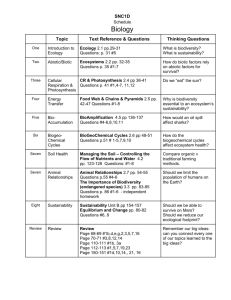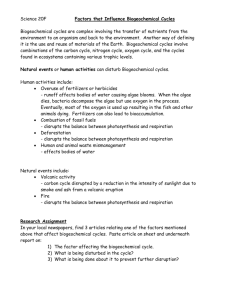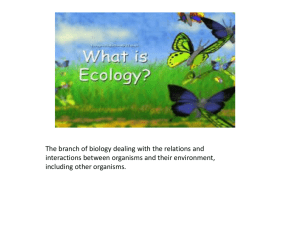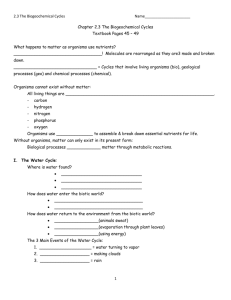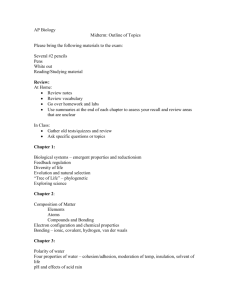Tuesday 3/24/2014
advertisement
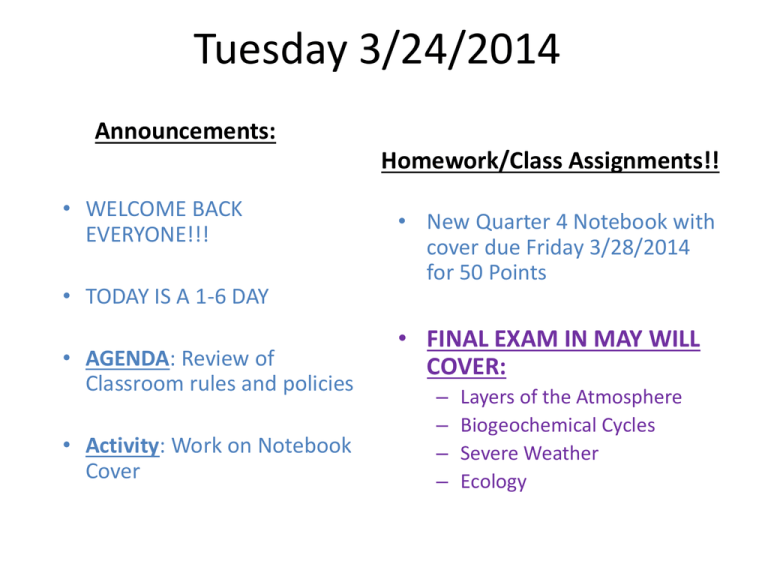
Tuesday 3/24/2014 Announcements: Homework/Class Assignments!! • WELCOME BACK EVERYONE!!! • TODAY IS A 1-6 DAY • AGENDA: Review of Classroom rules and policies • Activity: Work on Notebook Cover • New Quarter 4 Notebook with cover due Friday 3/28/2014 for 50 Points • FINAL EXAM IN MAY WILL COVER: – – – – Layers of the Atmosphere Biogeochemical Cycles Severe Weather Ecology Last notebook cover page!! 1. In search task bar: Quarter 4 2. Update Status bar: first and last name, include class period 3. 5 personal learning goals for the Quarter 4. 5 steps you will take to accomplish these goals 5. Write two facts about ecology or biology you know 6. Clubs or hobbies you are a part of or interested in 7. How do you get information and work you missed when absent? 8. My office hours and tutoring 9. Add a border around page that incorporates pictures involving ecology or biology 10. In profile picture area, what grade you hope to achieve this quarter and why you want that grade Wednesday/Thursday 3/26-3/27 Announcements: • WELCOME BACK EVERYONE!!! • TODAY IS A 1-6 DAY • Agenda: Review of Severe Weather • Notes: Ecology Unit • Activity: Reading Assignment due Today Homework/Class Assignments!! • New Quarter 4 Notebook with cover due Friday 3/28/2014 for 50 Points • Biodiversity Reading Assignment due Today for 50 Points What is Ecology? • Ecology – – “eco” – Greek for “house” – “ology” – “the study of” • The scientific study of the interactions and relationships between living organisms (plants, animal, humans) and their environments ECOLOGY Energy Transfer/Flow Types of Organisms Ecology of Organisms Population BIOSPHERE= the thin volume of Earth and its atmosphere that support life. ECOSYSTEMS- includes all of the organisms and the non-living environmental components found in a particular place. COMMUNITIES- includes all the interacting organisms living in an area. POPULATIONS- includes all the members of a species that live in one place at one time. ORGANISMS- simplest level= individual If you were referring to koalas living in the same area, you are talking about the…. And the answer is…. Population If you were talking about the frogs, fish, and snails in the same area, you would be referring to the… And the answer is… Community Friday 3/28/2014 Announcements: Homework/Class Assignments!! • HAPPY FRIDAY!!! • AGENDA: Review Biogeochemical Cycles • Activity: Review Mind Map on Cycles • New Quarter 4 Notebook with cover due TODAY 3/28/2014 for 50 Points • Cycles Mind Map Due Monday 3/31/2014 for 40Points Biogeochemical Cycles QUESTION: How does our planet, as a whole, work to recycle its resources and provide life? ANSWER: Biogeochemical Cycles “Bio” – Life “Geo” – Earth “Chemical” – Chemical Cycle – a periodically repeated sequence of events • Energy does NOT get recycled through an ecosystem, but chemicals (nutrients) do! • Water and minerals, such as carbon (C), nitrogen (N), calcium (Ca), and phosphorus (P), are recycled and reused by plants, animals and humans. • Nutrients are recycled through living and dead animals (and humans), the atmosphere, the oceans, and rocks. The 4 Main Biogeochemical Cycles • Carbon Cycle - Photosynthesis and cellular respiration. • Water Cycle - Evaporation, Transpiration, Condensation, Precipitation and Collection • Nitrogen Cycle - death and waste; nitrogenfixing bacteria; reintroduced to soil for plants; plants feed animals Cycles Mind Map Review Using what you know about Biogeochemical Cycles, please construct the following Mind Map Main Heading: Biogeochemical Cycles 1. Please include the definition and what each prefix means Sub Heading #1: Water Cycle 1. Please include 10 facts Sub Heading #2: Nitrogen Cycle 1. Please include 10 facts Sub Heading 3#: Carbon Cycle 1. Please include 10 facts In two paragraphs, discuss how the 3 Biogeochemical Cycles and Ecology relate to each other and answer the following questions: How does the recycling of nutrients and chemicals support life in ecosystems? What are three possible reasons organisms would not survive without nutrients from the biogeochemical cycles? What source of energy supports the functioning of the cycles and how does it relate

